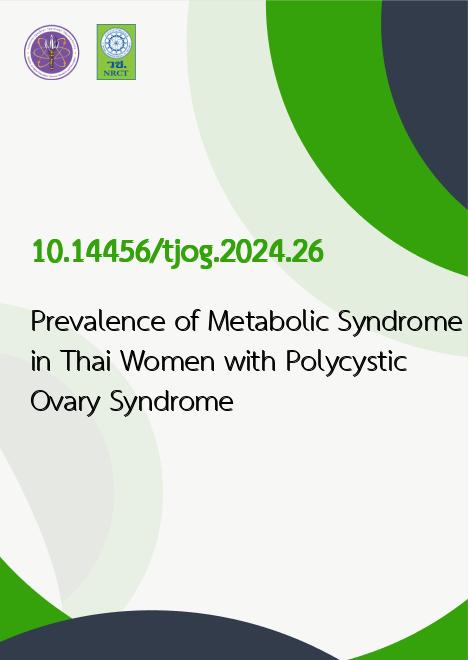
|
Prevalence of Metabolic Syndrome in Thai Women with Polycystic Ovary Syndrome |
|---|---|
| รหัสดีโอไอ | |
| Creator | Bralee Sangkate |
| Title | Prevalence of Metabolic Syndrome in Thai Women with Polycystic Ovary Syndrome |
| Contributor | Nuntasiri Eamudomkarn, Nampet Jampathong |
| Publisher | PIMDEE Co., Ltd. |
| Publication Year | 2567 |
| Journal Title | Thai Journal of Obstetrics and Gynaecology |
| Journal Vol. | 32 |
| Journal No. | 3 |
| Page no. | 234-244 |
| Keyword | metabolic syndrome, abnormal glucose metabolism, obesity, PCOS |
| URL Website | https://tci-thaijo.org/index.php/tjog/index |
| Website title | www.tci-thaijo.org |
| ISSN | 2673-0871 |
| Abstract | Objectives: To assess the prevalence and associated risk of metabolic syndrome (MS) among Thai women with polycystic ovary syndrome (PCOS).Materials and Methods: A retrospective study was conducted in 337 women visiting Khon Kaen University Hospital between January 2014 and December 2021. The data on weight, height, waist circumference (WC), waist to hip ratio (WHR), and laboratory results were reviewed. The diagnosis of MS was made by International Diabetes Federation (IDF) and National Cholesterol Education Program Adult Treatment Panel III (NCEP ATP III) criteria. Multiple logistic regression was applied to calculate adjusted odds ratio (aORs) and 95% confidence intervals (CIs)Results: Three hundred and thirty-seven patients were reviewed. Median (interquartile range) of age, body mass index (BMI), WC, and WHR were 24 (2129) years, 25 (21-31) kg/m2, 80 (70-90) cm, and 0.85 (0.79-0.89), respectively. The prevalence of MS was 27.3% and 20.8% according to the criteria of IDF and NCEP ATP III, respectively. Age 30 years or older (aOR 1.89, 95%CI 1.06-3.40), positive family history of MS and/or diabetes mellitus (aOR 2.77, 95% CI 1.66-4.65), and having exercise behavior (aOR 0.45, 95% CI 0.23-0.86) were found to be independently associated with MS in PCOS women.Conclusion: MS was highly prevalent among PCOS women residing in the Northeast Thailand. Factors associated with MS odds included age, family history of MS and/or diabetic mellitus, and exercise behavior. |